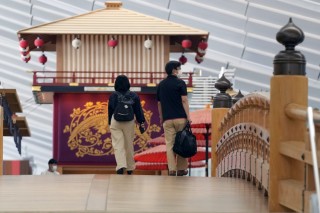Loading
Search
▼ Japan Expands COVID State Of Emergency To 3 Areas Near Tokyo And Osaka
- Category:Other
Japan expanded Monday a COVID-19 state of emergency covering the capital and Okinawa to include Osaka and three prefectures near Tokyo due to a recent spike in coronavirus cases amid fears of a medical system collapse during the Olympics.
The government of Prime Minister Yoshihide Suga has added Chiba, Kanagawa, Saitama and Osaka prefectures to areas under the emergency through Aug 31. The emergency period in Tokyo and Okinawa was also extended to the end of the month from the initially planned Aug 22.
Establishments serving alcohol or offering karaoke in the six prefectures under the emergency are asked to close during the period, with the government providing money for compliance. Those not serving alcohol are requested to close at 8 p.m.
The government is expected to outline how it will ease restrictions as inoculation of the population progresses, but the end of the epidemic is not in sight yet in the country.
The surge in infections comes amid the spread of the virus's highly contagious Delta variant, first detected in India.
On Sunday, the nationwide tally of new infections topped 10,000 for the fourth straight day, with 28.3 percent of Japan's population of 126 million fully vaccinated against COVID-19 as of Friday.
Outside the six prefectures, a quasi-state of emergency, which carries fewer restrictions on business activity than the state of emergency, was imposed Monday on parts of five prefectures -- Hokkaido, Ishikawa, Kyoto, Hyogo and Fukuoka -- through the end of August.
Serving alcohol is banned and restaurants not serving liquor are requested to close at 8 p.m. in the five prefectures under the quasi-state of emergency as well. Governors are authorized to relax restrictions based on improvements in the situation.
However, many people in Japan have grown skeptical about the effectiveness of states of emergency partly because they are tired of restrictions, with some ignoring authorities' stay-at-home requests as the country hosts the Olympic Games.
"Since the Olympics are being held, many people might be thinking that it is fine to go out," said Narumi Sakai, a 54-year-old woman who was on her way to work, at JR Tokyo Station.
"The train was as packed as ever," said Tetsu Shiozawa, 46, at JR Kannai Station near the Kanagawa prefectural government office, doubting the effectiveness of the emergency declaration.
Yoshitaka Yamazaki, a 73-year-old lawyer, said at JR Osaka Station that he felt the train hub was as crowded as before the spread of the coronavirus, adding that he believes most of those out on the streets are young people "with little sense of caution."
A 38-year-old public servant in Chiba city forecast "a continuous repetition" of virus emergencies in Japan.
The surge in the number of COVID-19 infections in the country became particularly notable after a four-day weekend late last month, fueling worries about the strain on the health care system.
According to data released by the Health, Labor and Welfare Ministry, the number of COVID-19 patients quarantining or being taken care of at home stood at 18,927 last Wednesday, 1.8 times the number a week earlier.
Hospital bed occupancy rates for COVID patients in Tokyo, Saitama, Ishikawa, and Okinawa prefectures were 50 percent or higher, the level that the government's COVID-19 subcommittee designates as stage 4, the highest level of alert.
The National Governors' Association on Sunday urged people to refrain from making trips across prefectural borders in principle during the summer and Bon holidays, and in cases of making essential trips it asked people to take virus tests.
The association agreed in a meeting the same day to ask the central government to study ways to impose a lockdown to better contain the virus, expressing particular concern about the transmission of the more contagious Delta variant.
Suga said earlier he believes legislation that would enable the government to impose the kind of hard lockdowns seen in many major cities abroad last year would "not suit" the Japanese people. The central government also wants the public to refrain from crossing prefectural borders in principle.
Suga told a press conference on Friday, "We will conduct antivirus measures to make this declaration the last (COVID-19) emergency." He also said the government will aim to have over 40 percent of the public fully vaccinated by late August.
© KYODO
- August 2, 2021
- Comment (0)
- Trackback(0)


